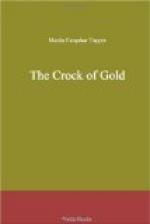The bank—the county bank—Shark, Breakem, and Company—this was the specious Eldorado, the genuine gold-increaser, the hive where he would store his wealth (as honey left for the bees in winter), and was to have it soon returned fourfold. It was indeed a thought to make the rich man glad, that all his shining heap was just like a sample of seed-corn, and the pocket-full should next year fill a sack. How grudgingly he now began to mourn over past extravagance, five pieces gone within the week! how close and careful he resolved to be in future! how he would scrape and economize to get and save but one more of those sweet little seeds, that yield more gold—more gold! And if Roger had been privileged in youth to have fed upon the wisdom of the Eton Latin grammar, he could have now quoted with some experimental unction the “Crescit Amor” line, which every body well knows how to finish. Truly, it was growing with his growth, and rioting in strength above his weakness.
Swollen with this expanding love, he packed up his money in what were, though he knew it not, rouleaux, but to his plebeian eyes looked more like golden sausages: and he would take it to the bank, and they should bow to him, and Sir him, and give him forthwith more than he had brought; and if those summary gains were middling great—say twice as much, to be moderate—he thought he might afford himself a chaise coming back, and return to Hurstley Common like a nabob. Thus, full of wealthy fancies, after one glass more, off set Roger to the county town, with his treasure in a bundle.
Half-way to it, as hospitality has ordained to be the case wherever there be half-ways, occurred a public-house: and really, notwithstanding all our monied neophyte’s economical resolutions, his throat was so “uncommon dry,” that he needs must stop there to refresh the muscles of his larynx: so, putting down his bundle on the settle, he called for a foaming tankard, and thanking the crock, as his evil wont now was, sat down to drink and think. Here was prosperity indeed, a flood of astonishing good fortune: that he, but a little week agone, a dirty ditcher—so was he pleased to designate his former self—a ragged wretch, little better than a tramp, should be now progressing like a monarch, with a mighty bag of gold to enrich his county town. To enrich, and be thereby the richer; for Roger’s actions of finance were so simple, as to run the risk of being called sublimely indistinct: he took it as an axiom that “money bred money,” but in what way to draw forth its generative properties, whether or not by some new-fangled manure, he was entirely ignorant; and it clearly was his wisdom to leave all that mystery of money-making solely to the banker. All he cared about was this: to come back richer than he came—and, lo! how rich he was already. Lolling at high noon, on a Wednesday too, in the extremest mode of rustic beauism, with a bag of gold by his side, and a pot of porter in his hand—here




